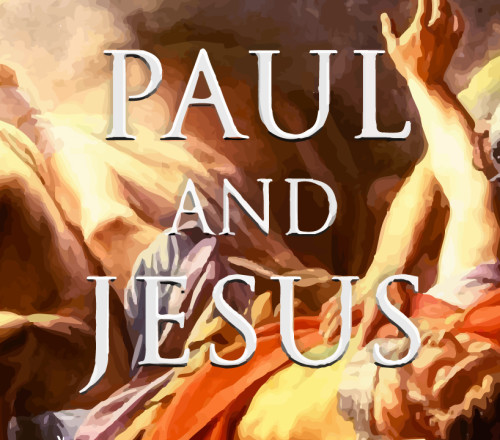How Can Caleb Be From Judah & Be A Kenizzite? – Jono & Jason
Why is Caleb the poster boy of the Messianic/Hebrew Roots movement? How is his status hijacked by Pauline theology? Is Caleb the anomaly who serves as the sole example of being “grafted in” or is there another explanation which is common knowledge in the Jewish world but concealed by New Testament teachers. In this program, Jason & Jono reveal the secret to the question “how can Caleb be from Judah AND be a Kenizzite?”
Join us for this year’s Tanakh Tour of Israel!
[sc_embed_player fileurl=”https://truth2u.org/wp-content/uploads/Audio/Truth2U%20-%20Jono%20%26%20Jason%20-%20How%20is%20Caleb%20of%20the%20Tribe%20of%20Judah%20and%20a%20Kenizzite.mp3″ autoplay=”true” loops=”true”]
[sg_popup id=6]





Oh guys…. I don’t know what you’re reading, but, Moshe’s father-in-law is from Midiyan. Also, it is forbidden to say that Ruth and Rahav were “grafted in”. They had a true conversion, and, that makes them as Jewish as I am, (I was born a Jew, thank G-D ) their respective pasts no longer exist. And, while you’re at it, please stop using the language of the church to refer to Jews. I know it’s second nature to you, because you were raised in it, but, please stop, , it makes most of us twitch. You’re home now, and, there’s no need for you to keep speaking as if you’re still strangers amongst us. Other than those two little notes, this was a fantastic show.
Caleb is clearly identified as the biological son of Yefuneh. He is called “the Kenizzite” because Othniel was his stepbrother and Othniel’s father was one.
So think in modern terms: a couple gets divorced and the mother remarries. The son from the first marriage may call his step-father “daddy” but he isn’t his biological son. This is the situation with Caleb.
Bamidbar / Numbers 13:6 From the tribe of Judah, Caleb son of Yefuneh.
So clearly Torah says Caleb was the son of Yefuneh who was of the tribe of Judah. This is repeated in Joshua 15:13. And to Caleb the son of Yefuneh he gave a part among the children of Judah. . .17. And Othniel the son of Kenaz, the brother of Caleb. . .
Numbers 13:6 Caleb is the SON (biological) of Yefuneh.
Joshua 15:13 Caleb is the SON (biological) of Yefuneh.
Joshua 15:17 His (half) brother Othniel was the son of Kenaz.
Since Caleb can’t have two daddies and he is identified as the son of Yefuneh of the tribe of Judah then ipso facto his mother married Kenaz after his father died (or divorced her) giving him a half brother and identifying to some extent with his step-father.
Not everyone named “Kenaz” in the Hebrew Bible was a Gentile. There was a “Kenaz” among the descendants of Judah. Start here:
1 Chronicles 4:1(JPT) – (1) The sons of Judah; Perez, Hezron, and Carmi, and Hur, and Shobal.
Then continue through here:
1 Chronicles 4:13(JPT) – (13) And the sons of Kenaz: Othniel and Seraiah, and the sons of Othniel: Hathath.
And then go to:
1 Chronicles 4:15(JPT) – (15) And the sons of Caleb the son of Jephunneh: Iru, Elah, and Naam, and the sons of Elah: Uknaz.
So that Jephunneh was one of the descendants of this Kenaz, and was definitely a Jew from the Tribe of Judah and, therefore, Caleb the son of Jephunneh is legitimately from the Tribe of Judah. The Caleb son of Hezron is a different person altogether. [Rashi and other commentators cite the Talmud with a different explanation that says Caleb was actually the son of Hezron. I’m not sure I concur with this since there’s a simpler explanation and my Hebrew concordance lists them as separate individuals, but, then who am I to challenge our great Sages anyway?…lol In either case, whether you go with the Talmud or with my explanation, Caleb was definitely from the blood line of Judah.].
In a nutshell: Caleb was the natural son of Ḥezron (1 Chronicles 2:18 / Divrei Hayamim Alef 2:18), son of Peretz (verse 5), son of Judah (verse 4), and stepson of Kenaz (whom his mother married after Ḥezron died). This is why Caleb is referred to as הַקְּנִזִּי “the K’nizzi” (B’midbar / Numbers 32:12; Y’hoshua / Joshua 14:6, 14:14), that is “belonging to the family of Kenaz”, but never as בֶּן קְנַז (“son of Kenaz”). He was popularly known as כָּלֵב בֶּן יְפֻנֶּה Caleb ben Y’funneh, but יְפֻנֶּה Y’funneh is not a name; בֶּן יְפֻנֶּה ben Y’funneh is descriptive and means “the one who turned” − i.e. who “turned against the other ten explorers” (B’midbar / Numbers 13:30).
G’day Miriam, thank you for your comment. The verse in question from which I read was Judges 1:16. I understand your objection to the suggestion that Ruth & Rahab were “grafted in”. In this program we often express the perspective of our previous tradition; the point we attempted to convey was that Caleb inherited land where as Ruth and Rahab married into the security of their husband’s inheritance.
As for “using the language of the church to refer to Jews”, I know it’s cringe-worthy. my apologies, please keep us accountable. 🙂
Grafting is a poor choice of words (sorry guys) as grafting is forbidden in the Torah. The Hebrew word for a grafted species is כִּלְאַֽיִם kil’ayim and the practise of grafting one species of tree into another is prohibited in Vayikra / Leviticus 19:19 and again in D’varim / Deuteronomy 22:9. Becoming Jewish through conversion is not “grafting” — it is truly becoming a new person through the conversion.
Bravo Jono! Animals stay out even in our very cold weather here in Canada. The cows, horses, cats, mice, thank god. To compare Caleb to a dog ..weird. Why was he named that. To be called a dog is a put down. No name change later on either!
From Wikipedia, the free encyclopedia
Caleb is a Hebrew masculine given name. The Hebrew spelling of the name Caleb – כלב – is identical with the spelling of the word “dog” – “kelev”. The composing of the Bible antedates by thousands of years the introduction of the Niqqud system of diacritical signs which modern Hebrew uses to represent vowels. Thus, it is difficult to ascertain how the name was originally pronounced. Many name books and websites list the meaning of “Caleb” as “Dog”. It is noteworthy that many Biblical characters bore animal names, including names which in the sensibilities of later times would be considered insulting, such as the woman prophet Hulda whose name means “weasel”. In some traditions, Caleb’s being a “dog” symbolizes his devotion to God.
An alternate Hebrew meaning offered for “Caleb” is “faithful, devotion, whole hearted, bold, brave”. This, on the basis of its being actually a compound word, a phenomenon quite common in ancient Hebrew. Col (כל, Caf + Lamed) = “all” or “whole”; Lev (לב, Lamed + Bet) = “heart”. Therefore, Caleb (or Calev as pronounced in Hebrew) would actually mean “whole hearted”. This might be due to the Biblical Caleb, a companion of Moses and Joshua, being noted for his astute powers of observation and fearlessness in the face of overwhelming odds.
Many words in Hebrew are spelled identically (consonants) but they are different words with different pronunciations. To know the correct pronunciation the word must be read in context in the sentence.
While you are correct that the introduction of the Niqqud system by the Masoretes is only about 1000 years old Jews have been pronouncing these words as long as they have existed. The Masoretes did not invent the pronunciations — they merely noted them for people less familiar with Hebrew.
In modern Israel newspapers (for example) do not use כָּלֵב vowels at all — only consonants. People well versed in Hebrew can read them with ease.
The name of the person in the T’nach is כָּלֵב while the word for dog is כָּ֫לֶב — notice the difference in the vowels? In Hebrew many words may be spelled with the same consonants but have different meanings based on how they are vocalized. The word for dog (כָּ֫לֶב) is pronounced closer to “kelev” where the name, כָּלֵב, is pronounced more like Kalev.
hello Jono. Great job with this study. I heard this not from a messianic enviroment but in a study from Nehemia Gordon. I respect you both! but clearly their can only be one truth. i don’t know if you are still in contact with Nehemia but i think it would be interresting if the both of you talked about it. I life in Belgium, we are not with many people but our hearts burns in us for יהוה. And we can’t stand any more lies that christianity or messianic teaches the people and keeping them away from the true message in the thora!!respect. And may it be in our days that we will return to the land!
G’day David, although the “Caleb is grafted in” theory is understandably attractive in the ears of the Christian/Messianic persuasion, Truth2U has no interest in comforting and accommodating an idolatrous faith (even as lucrative the market may be for those willing to do so).
The term Jew as a people is not used correctly today. A Biblical Jew is one who is from the tribe of Judah. A truism: Today people consider a Jew anyone of the 12 tribes ??? This is not so Biblically since only Judah was left (i.e., with Benjamin) after the Northern 10 tribes were dispersed by Assyria. Someone please explain why this is so.